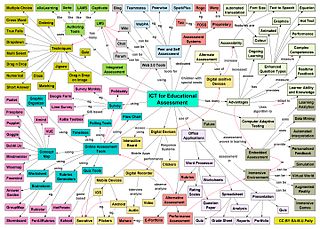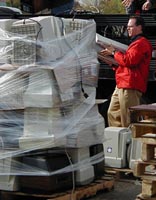DCI may be an abbreviation for:
The digital divide is the unequal access to digital technology, including smartphones, tablets, laptops, and the internet. The digital divide creates a division and inequality around access to information and resources. In the Information Age in which information and communication technologies (ICTs) have eclipsed manufacturing technologies as the basis for world economies and social connectivity, people without access to the Internet and other ICTs are at a socio-economic disadvantage, for they are unable or less able to find and apply for jobs, shop and sell online, participate democratically, or research and learn.
The global digital divide describes global disparities, primarily between developed and developing countries, in regards to access to computing and information resources such as the Internet and the opportunities derived from such access. As with a smaller unit of analysis, this gap describes an inequality that exists, referencing a global scale.

Advertising mail, also known as direct mail, junk mail, mailshot or admail, letterbox drop or letterboxing (Australia) is the delivery of advertising material to recipients of postal mail. The delivery of advertising mail forms a large and growing service for many postal services, and direct-mail marketing forms a significant portion of the direct marketing industry. Some organizations attempt to help people opt out of receiving advertising mail, in many cases motivated by a concern over its negative environmental impact.

Information and communications technology (ICT) is an extensional term for information technology (IT) that stresses the role of unified communications and the integration of telecommunications and computers, as well as necessary enterprise software, middleware, storage and audiovisual, that enable users to access, store, transmit, understand and manipulate information.
Green computing, green IT, or ICT sustainability, is the study and practice of environmentally sustainable computing or IT.

Electronic waste recycling, electronics recycling ore-waste recycling is the disassembly and separation of components and raw materials of waste electronics; when referring to specific types of e-waste, the terms like computer recycling or mobile phone recycling may be used. Like other waste streams, re-use, donation and repair are common sustainable ways to dispose of IT waste.

A telecentre is a public place where people can access computers, the Internet, and other digital technologies that enable them to gather information, create, learn, and communicate with others while they develop essential digital skills. Telecentres exist in almost every country, although they sometimes go by a different names including public internet access center (PIAP), village knowledge center, infocenter, Telecottage, Electronic Village Hall, community technology center (CTC), community multimedia center (CMC), multipurpose community telecentre (MCT), Common/Citizen Service Centre (CSC) and school-based telecentre. While each telecentre is different, their common focus is on the use of digital technologies to support community, economic, educational, and social development—reducing isolation, bridging the digital divide, promoting health issues, creating economic opportunities, and reaching out to youth for example.

Free Geek is a technology related non-profit organization based in Portland, Oregon, launched on April 22, 2000. It started as a public event at Pioneer Courthouse Square. In September 2000, it opened a permanent facility as a drop off site for electronic waste. In January 2001, local newspaper The Oregonian ran an article advertising their free computer program for volunteers, which became so successful that they had to start a waiting list. They currently have over 2,000 active volunteers per year.
Nonprofit technology is the deliberative use of technology by nonprofit organizations to maximize potential in numerous areas, primarily in supporting the organization mission and meeting reporting requirements to funders and regulators.
Antonia "Toni" Stone was an educator and pioneering activist against the growing digital divide who created the United States' first community technology center. After 20 years as a mathematics teacher in New York City private schools, Stone changed her focus to technology education for poor communities and formerly incarcerated adults.

Ungana-Afrika, Swahili for "connect africa", is a non-governmental organisation based in Pretoria, South Africa that provides a wide range of ICT services for civil society within and outside of the continent. It aims to better empower civil society organisations, networks and related stakeholders, in terms of ICT capacity and resources, so they may more efficiently achieve their unique social missions.
Net Literacy is an Indianapolis based 501(c) non-profit organization that promotes computer and Internet literacy. The program is youth-run, with adult mentoring. All participants receive instruction for free.
Virtual volunteering refers to volunteer activities completed, in whole or in part, using the Internet and a home, school buildings, telecenter, or work computer or other Internet-connected device, such as a smartphone or a tablet. Virtual volunteering is also known as online volunteering, remote volunteering or e-volunteering. Contributing to free and open source software projects or editing Wikipedia are examples of virtual volunteering.

IUPUI University Library is the university library of Indiana University–Purdue University Indianapolis. IUPUI is an urban campus of Indiana University and Purdue University in Indianapolis, Indiana, United States. Indiana University is the managing partner.
Empower Up, formerly known as CREAM, a 501(c)(3), was a computer recycling center in SW Washington. Started in mid-2002, Empower Up took old electronics in for donation, and recycled/distributed them.
A sustainability organization is (1) an organized group of people that aims to advance sustainability and/or (2) those actions of organizing something sustainably. Unlike many business organizations, sustainability organizations are not limited to implementing sustainability strategies which provide them with economic and cultural benefits attained through environmental responsibility. For sustainability organizations, sustainability can also be an end in itself without further justifications.
Computer technology for developing areas is a field focused on using technology to improve the quality of life and support economic development in regions with limited access to resources and infrastructure. This area of research seeks to address the digital divide, which refers to the gap between those who have access to technology and those who do not, and the resulting inequalities in education, healthcare, and economic opportunities.
World Computer Exchange (WCE) is a United States and Canada based charity organization whose mission is "to reduce the digital divide for youth in developing countries, to use our global network of partnerships to enhance communities in these countries, and to promote the reuse of electronic equipment and its ultimate disposal in an environmentally responsible manner." According to UNESCO, it is North America's largest non-profit supplier of tested used computers to schools and community organizations in developing countries.

The International Society for Technology in Education (ISTE) is a nonprofit organization that focuses on accelerating innovation in education through the smart use of technology in education. ISTE provides a variety of services to support professional learning for educators and education leaders, including ISTELive—an ed tech event, the ISTE Standards for learning, teaching and leading with technology, and ISTE Certification. ISTE also provides a suite of professional learning resources, including webinars, online courses, consulting services, books, and peer-reviewed journals and publications.







